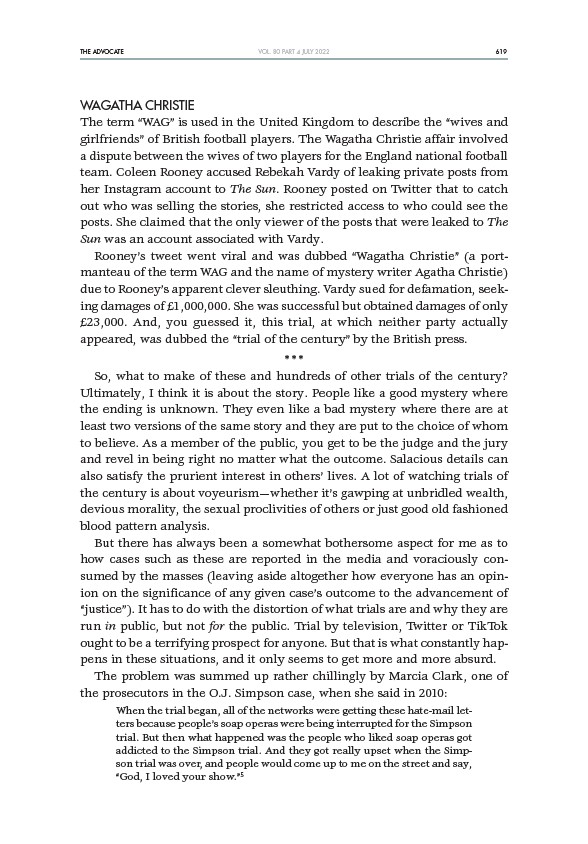
THE ADVOCATE 619
VOL. 80 PART 4 JULY 2022
WAGATHA CHRISTIE
The term “WAG” is used in the United Kingdom to describe the “wives and
girlfriends” of British football players. The Wagatha Christie affair involved
a dispute between the wives of two players for the England national football
team. Coleen Rooney accused Rebekah Vardy of leaking private posts from
her Instagram account to The Sun. Rooney posted on Twitter that to catch
out who was selling the stories, she restricted access to who could see the
posts. She claimed that the only viewer of the posts that were leaked to The
Sun was an account associated with Vardy.
Rooney’s tweet went viral and was dubbed “Wagatha Christie” (a portmanteau
of the term WAG and the name of mystery writer Agatha Christie)
due to Rooney’s apparent clever sleuthing. Vardy sued for defamation, seeking
damages of £1,000,000. She was successful but obtained damages of only
£23,000. And, you guessed it, this trial, at which neither party actually
appeared, was dubbed the “trial of the century” by the British press.
***
So, what to make of these and hundreds of other trials of the century?
Ultimately, I think it is about the story. People like a good mystery where
the ending is unknown. They even like a bad mystery where there are at
least two versions of the same story and they are put to the choice of whom
to believe. As a member of the public, you get to be the judge and the jury
and revel in being right no matter what the outcome. Salacious details can
also satisfy the prurient interest in others’ lives. A lot of watching trials of
the century is about voyeurism—whether it’s gawping at unbridled wealth,
devious morality, the sexual proclivities of others or just good old fashioned
blood pattern analysis.
But there has always been a somewhat bothersome aspect for me as to
how cases such as these are reported in the media and voraciously consumed
by the masses (leaving aside altogether how everyone has an opinion
on the significance of any given case’s outcome to the advancement of
“justice”). It has to do with the distortion of what trials are and why they are
run in public, but not for the public. Trial by television, Twitter or TikTok
ought to be a terrifying prospect for anyone. But that is what constantly happens
in these situations, and it only seems to get more and more absurd.
The problem was summed up rather chillingly by Marcia Clark, one of
the prosecutors in the O.J. Simpson case, when she said in 2010:
When the trial began, all of the networks were getting these hate-mail letters
because people’s soap operas were being interrupted for the Simpson
trial. But then what happened was the people who liked soap operas got
addicted to the Simpson trial. And they got really upset when the Simpson
trial was over, and people would come up to me on the street and say,
“God, I loved your show.”5